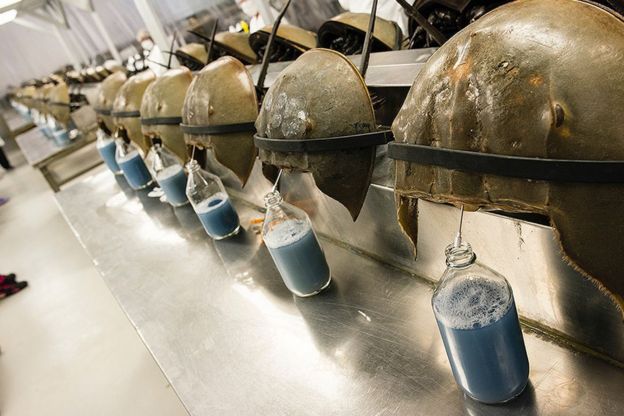General Discussion
Related: Editorials & Other Articles, Issue Forums, Alliance Forums, Region ForumsHorseshoe crab blood is key to making a COVID-19 vaccine
Conservationists worry the animals, which are vital food sources for many species along the U.S. East Coast, will decline in number.
Each spring, guided by the full moon, hundreds of thousands of horseshoe crabs clamber onto beaches across the U.S. mid-Atlantic to lay their eggs. For hungry birds, it’s a cornucopia. For drug companies, it’s a crucial resource for making human medicines safe.
That’s because these animals’ milky-blue blood provides the only known natural source of limulus amebocyte lysate, a substance that detects a contaminant called endotoxin. If even tiny amounts of endotoxin—a type of bacterial toxin—make their way into vaccines, injectable drugs, or other sterile pharmaceuticals such as artificial knees and hips, the results can be deadly.
“All pharmaceutical companies around the world rely on these crabs. When you think about it, your mind is boggled by the reliance that we have on this primitive creature,” says Barbara Brummer, state director for The Nature Conservancy in New Jersey.
Every year, pharmaceutical companies round up half a million Atlantic horseshoe crabs, bleed them, and return them to the ocean— after which many will die. This practice, combined with overharvesting of the crabs for fishing bait, has caused a decline in the species in the region in the past few decades.
In 1990, biologists estimated 1.24 million crabs spawned in Delaware Bay, a main egg-laying spot and prime collection point for the companies. By 2002, that number had dropped to 333,500. In recent years, numbers of Delaware Bay spawning crabs have hovered around the same amount, with the 2019 survey estimating about 335,211. (The pandemic canceled the 2020 crab count.)
Catching crabs and harvesting their blood is time-consuming, and the resulting lysate costs $60,000 per gallon. In 2016, a synthetic alternative to crab lysate, recombinant factor C (rFC), was approved as an alternative in Europe, and a handful of U.S. drug companies also began using it.
But on June 1, 2020, the American Pharmacopeia, which sets the scientific standards for drugs and other products in the U.S., declined to place rFC on equal footing with crab lysate, claiming that its safety is still unproven.
Starting in July, Swiss-based Lonza will begin manufacturing a COVID-19 vaccine for human clinical trials—and they’ll have to use lysate in the vaccine if they plan to sell it in the U.S. (Here’s how we’ll know when a COVID-19 vaccine is ready.)
https://www.nationalgeographic.com/animals/2020/07/covid-vaccine-needs-horseshoe-crab-blood/?cmpid=org=ngp::mc=social::src=linkedin::cmp=editorial::add=li20200706animals-newanimalscovidhorseshoecrabs::rid=&sf235662853=1
underpants
(195,585 posts)Fascinating. Thanks
Maru Kitteh
(31,395 posts)Doremus
(7,273 posts)soothsayer
(38,601 posts)Instead of killing em
Grown2Hate
(2,205 posts)them to the ocean, after which "many will die". Sounds like they try to do just that, but they're probably in a weakened state.
soothsayer
(38,601 posts)Duppers
(28,469 posts)Could be fed and protected for a while during recovery?
![]()
2naSalit
(100,988 posts)that I am beginning to feel that our species came here to destroy the planet.
Duppers
(28,469 posts)#2. Hire marine biologists to develop guidelines on how best to help them recover.
Very interesting, my friend. Thanks for posting.
![]()
IcyPeas
(25,158 posts)Because last month, the organisation that decides on what makes drugs safe in America said it can't prove the alternative works well enough.
Any companies wanting to sell medicines in the States have been told they need to keep using crab blood for testing.

